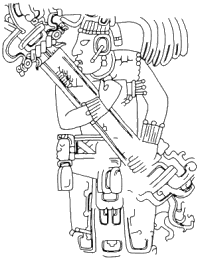Maya Prehistory and Caracol
 1200 B.C.-250 A.D.
1200 B.C.-250 A.D.
Preclassic small sedentary villages followed by development of monumentality and larger centers.
ca. 600-900 B.C.
Earliest known habitation at Caracol.
ca. A.D. 41
Structure A6-1st, “Temple of the Wooden Lintel,” constructed and consecrated; full Maya ritual complex present at Caracol.
ca. A.D. 150
Elaborate burial placed in Structure B34 locus.
A.D. 250-900
Classic “Peak” of Maya civilization; pyramids, tombs, inscriptions, widespread trade; by A.D. 800 Maya “collapse” is underway.
A.D. 331
Caracol Royal dynasty “officially” founded.
ca. A.D. 480
Unknown ruler’s tomb placed in Structure D16.
A.D. 531
Accession of Lord Water’s predecessor.
A.D. 537
Use of initial tomb in Structure B20-3rd.
A.D. 553
Accession of Caracol Ruler Lord Water.
A.D. 556
“Axe-Event” involving Tikal.
A.D. 562
“Star-War” defeat of Tikal by Caracol.
A.D. 575
Birth of Smoke Ahau.
A.D. 577
One of three tombs in Structure B20-2nd used.
A.D. 577 or 582
Front tomb in Structure A34 consecrated.
A.D. 588
Birth of Caracol Ruler Kan II.
A.D. 599
Accession of Caracol Lord Smoke Ahau.
A.D. 614
Tomb in Structure L3-2nd covered.
A.D. 618
Accession of Kan II.
A.D. 626-636
Naranjo wars; major expansion of Caracol follows.
A.D. 634
Woman’s tomb in Structure B19-2nd closed.
A.D. 658
Accession of Caracol Ruler Smoke Skull; Death of Kan II.
A.D. 680
Naranjo’s war of independence.
A.D. 696
Tomb in Structure A3-1st covered.
A.D. 702
Capture of Ixkun lord noted on Stela 21.
A.D. 800
Capture of 3 prisoners, including Ucanal lord, by Caracol Ruler Hok K’awil or his underlings.
A.D. 883
Last recorded date at Caracol on Altar 26.
A.D. 900-1500
Postclassic Most major sites located away from Classic Period centers, but near water. Sites are generally characterized by low-lying as opposed to monumental architecture.
ca. A.D. 950
Last use of Caracol Structures A6 and A31; Caracol totally abandoned.
A.D. 1500-present
“Historic” Europeans arrive in the New World; most native Maya populations disseminated by disease; others disrupted by warfare and forced population movements. Native populations still comprise over 50% of Guatemala and Yucatan.
*Timeline revised from A. Chase & D. Chase 1996; D. Chase & A. Chase 2017